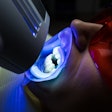A study published in the Cleft Palate—Craniofacial Journal has found little difference between mothers who were given a prenatal diagnosis of cleft lip and palate for their child and those who discovered the problem at birth (September 2010, Vol. 47:5, pp. 476-481).
The authors conducted interviews with 235 mothers of children ages 2 to 7 years with orofacial clefts. Of these children, 46% had been identified prenatally with cleft lip or cleft lip and palate. Overall, prenatal diagnosis is made in about 20% to 30% of pregnancies affected by an orofacial cleft.
Contrary to expectations, few advantages were found for having a prenatal diagnosis, the researchers noted. Those with early knowledge of the condition did not report greater satisfaction with information, support, and treatment outcomes, although they had more time to learn and prepare. The two groups did not differ in number of surgeries, expectations for surgeries, complications of surgery, or the quality of care as rated by the mother.
The one area of the study that did show a significant difference was feeding the newborn child. Infants born with orofacial clefts have unique feeding requirements, and feeding these infants can be difficult and anxiety-provoking for untrained providers and parents. Mothers who were given an early diagnosis reported more positively about providers' help in making it easier for their infants to feed.
Not only can parents make necessary emotional and medical adjustments with an early diagnosis, but they can also make more practical adjustments, the researchers wrote. Changes in employment, health insurance, and child care plans may be in order.
Copyright © 2010 DrBicuspid.com



















